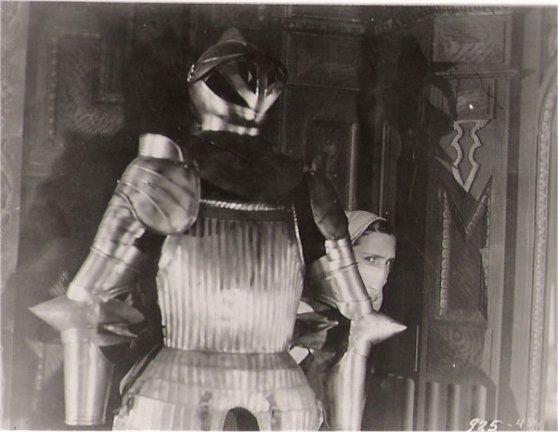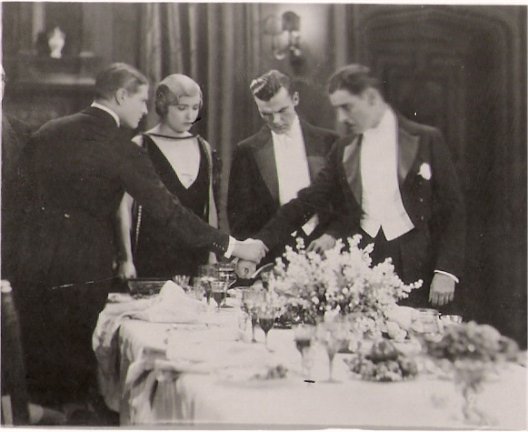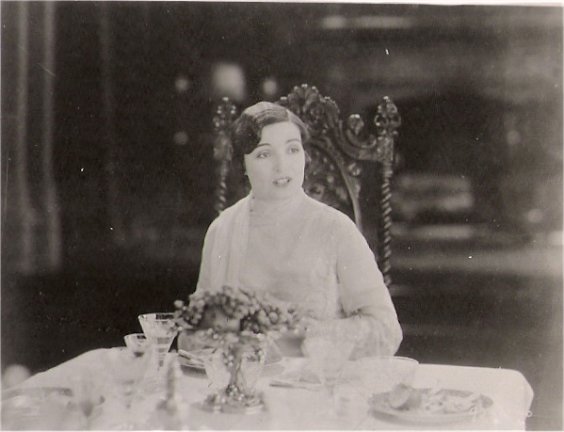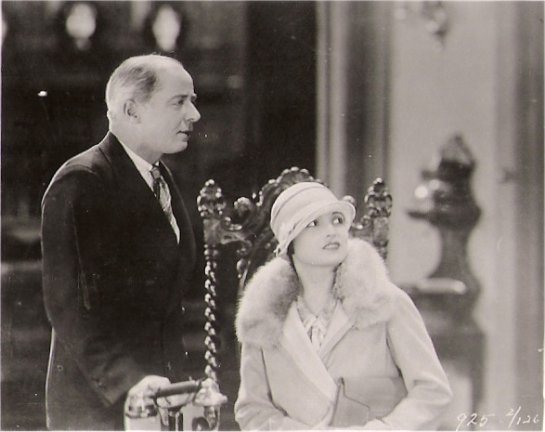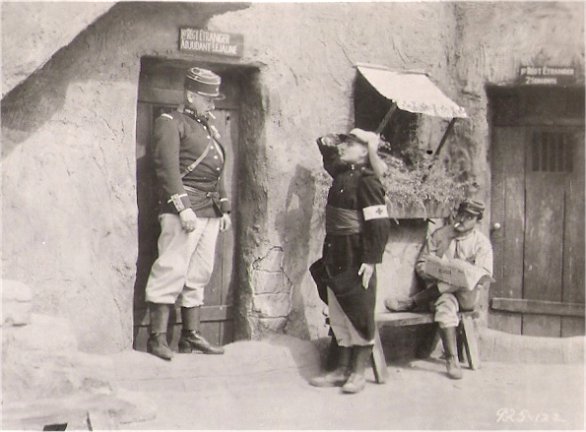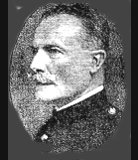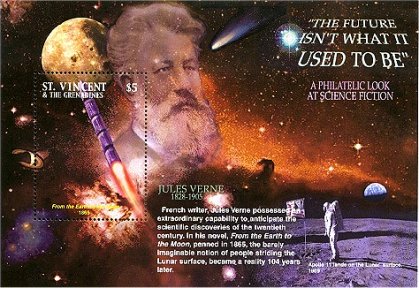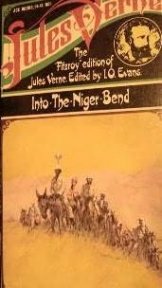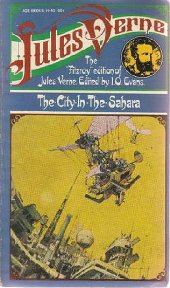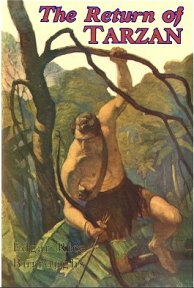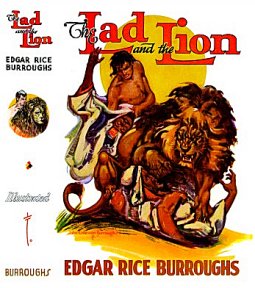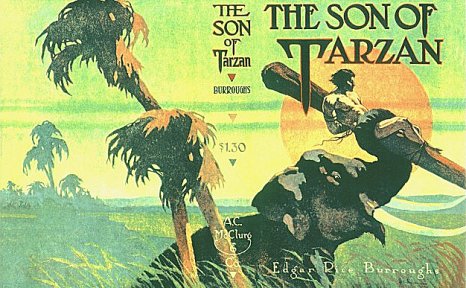There is no question
that E.M. Hull's
The Sheik
was a major influence on Wren as he actually parodies Mrs. Hull's novel
virtually by name.
With Wren the myth of the Sahara
and the Legion comes into full bloom.
If one has read only Beau
Geste one has read an amazingly good story, but to understand Wren's
intent it is necessary to read Beau Geste, Beau
Sabreur and Beau Ideal in sequence. By the time Wren
wrote, the handwriting was on the wall. The Western will had already
been sapped. The beau ideals that had inspired Western men since
the days of the Arthurian epics were fading from the Western consciousness,
being replaced by the effete homosexual 'ideals' of today.
The strength and confidence that allowed Western man to subjugate the world
was becoming just a memory. Wren in his way is either commemorating
the ideals or seeking to reverse the decline.
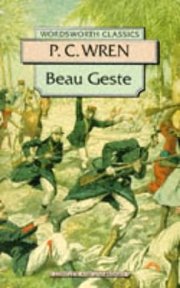
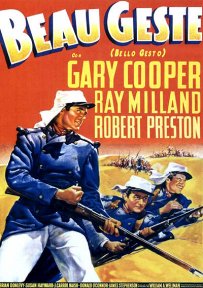
The three novels are concerned
with the fortunes of two families, one English, the other American.
Wren has a wonderful feel for the difference between the English and the
American characters, not to mention the French. His command of American
dialect and hobo slang is virtually alone worth reading the trilogy.
The first volume, Beau Geste,
based on Wilkie Collins The
Moonstone (a so-so read), concerns the early history of the Geste
brothers, Beau, Digby and John and the story of Fort Zinderneuf away out
there almost beyond a hobo's imagination.
The novel does introduce the
two American hoboes, Hank and Buddy, serving in the Legion.
Wren kills off Michael and Digby Geste in this first novel putting the
load on John.
In the second novel of the trilogy,
Beau
Sabreur (The good sword or swordsman) John returns to Africa to try
to locate Hank and Buddy who were lost in the drifting sands after saving
his life.
In this manner Wren introduces
the American family of which Hank is a member. Hank and his friend
Buddy were the two men lost in the desert that John Geste is seeking.
Both men lying in the desert near death in different locations were rescued
by the Bedouins. As luck would have it Hank managed to work
his way up to Sheik acquiring Buddy as his vizier. They introduce
superior Western discipline and tactics into their tribe giving them dominance
in the desert. Hank then comes to the attention of the French as
the new Mahdi. De Beaujolais is sent to coopt the new Mahdi.
Through a series of adventures De Beaujolais meets and falls in love with
Hank's sister Mary who is traveling with her other brother Otis Vanbrugh.
They, as well as Hank, are fleeing from a brutish father.
At stories end the whole cast
-- Henri De Beaujolais who had wed Mary, Otis, Hank, Buddy, John Geste
and his wife Isobel, who plays a large part -- are back at the ranch in
Texas facing the old brute of a father down while trying to free Hank's
other sister from thralldom to the old brute so she can marry Buddy and
begin a life of her own. Hold on, now, Wren must have been studying
Burroughs because he's got a number of twists up his sleeve, or perhaps,
tricks.
While Otis was in Algeria an
Arab dancing girl had fallen in love with him, who was apparently the queen
of the desert. Otis tried to escape her but in exchange for help
in recovering John from the penal battalion of the FFL he promised to marry
her. Aw shucks, that's right, you guessed it. Nakhla was in
reality his sister. The old brute had fathered her on another dancing
girl when he was out making deals in the desert. So we have Nakhla,
the same name as the heroine of Burroughs' The Lad And The Lion,
pretty much following the plot line of The
Girl From Farris's. So maybe Wren should also be included
in the Farmerian Wold Newton Universe.
So that is the broad overview
of the story line that holds the three volumes together. Before I go on
to the individual reviews there is one other problem I wrestle with that
I would like to to discuss and that is the Western fascination with primitive
life styles.
For a convenient starting point
we'll use H. Rider Haggard, no, cancel that. I'll go back a little
further to the French Wold Newton. Iím reading the Paul Feval Black
Coats series and they have some earlier antecedents. Balzac,
Dumas, Eugene Sue and Feval all deal with organized crime groups.
A Dumas title that I haven't been able to get is titled The Mohicans
Of Paris while Feval makes several references to crime organizations
adopting a sort of 'red indian' mentality. What Dumas called
Mohicans evolved into the Apaches of late nineteenth century Paris.
Anyone who watched TV in the fifties is familiar with French Apache dancing.
Thus, while the French were becoming
fascinated with the North American Indians and their primitive mentality,
Haggard was celebrating the primitive African mentality. And then
along comes Ouida, Verne, Hichens, Burroughs, Hull and Wren celebrating
the 'free and wild' life of the desert.
As of the beginning of the nineteenth
century, if not before, the Euroamericans evolved into the Scientific Consciousness
leaving the rest of the world behind in the mythopoeic or Religious Consciousness.
However the transition from one consciousness to the other is not a clean
break. Haggard, for instance, never really made the transition, while
Burroughs did. That may be why Burroughs reads as modern if a trifle
old fashioned, while Haggard is purely of an anterior psychology -- good
but just a little stodgy.
Thus, as the White Man spread
over the globe, the, what I shall I call it, White Man's Burden,
White Man's novel appeared. A whole genre of either stated or implied
White superiority appeared of which Haggard and Burroughs are the most
promient. From these writers the genre went on to the Sheena, Queen
Of The Jungle stuff to imitative White Jungle god stories. Conrad
sang the colonial era in lyric tones. Kipling told of the Raj of
India while inventing the White Man's Burden which was very real.
Ouida is usually credited with
the first FFL novel, Under Two Flags, while Burroughs contributed
The
Return of Tarzan in which Tarzan goes to Algeria as a French secret
agent, although not as FFL.
In 1924 P.C. Wren wrought the
glamor of the French Foreign Legion with the first novel of his trilogy,
Beau
Geste, followed by Beau Sabreur and Beau Ideal.
These novels are also scientific demonstrating the superiority of Euroamerican
intelligence over the mythopoeic mentality of the desert tribes.
Merely by introducing European military discipline into the tribe Hank
and Buddy enable the tribe to defeat all others and dominate the desert.
This while Abd El Krim and the Riff dominated Western news instilling admiration
for the primitive desert tribes over Western Civilization.
I had a teacher in high school who would get sexually aroused just talking
about El Krim.
Thus while the transition from
mythopoeic and scientific thinking was not complete if even half evolved
the West was presented with various mythopoeic cultures that drew them
back from the transition to the Scientific Consciousness. At present,
then, the West has a split personality in which they admire the Negro and
Arab mentality so much that they denigrate their own scientific side.
It doesnít seem likely that Euroamericans in sufficient numbers will make
the transition to Scientific Consciousness quickly enough to preserve Western
civilization hence the present bizarre worship of primitive races in North
America and Europe. On the other hand the rest of the world seeks
to imitate the West in matters that they cannot understand or sustain on
their own. If the West is in trouble imagine the actual psychological
state of things in China and India.
Now it is time to move on to
the first of the reviews -- Beau Geste.
FILM STILLS FROM THE 1926 FILM
